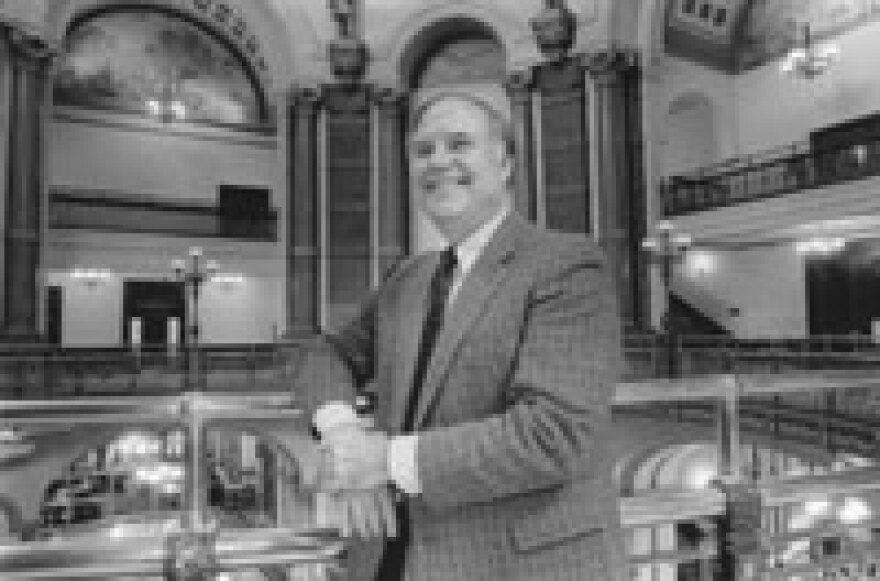The NCAA men’s basketball Final Four showdown is just days away, and the NBA playoffs start in a couple of months.
A key element for successful hoopsters at any level, knowledgeable fans know, is the transition game — how well a team makes the shift from offense to defense and vice versa. Does it get back on defense fast enough to thwart an opponent’s fast-break hopes? Is it quick enough going the other way to score easy baskets?
The transition game is important in politics, too, as successful candidates are asked to become competent public officials. But while a basketball team has dozens of times every game to showcase its up-and-down-the-floor skill, newly elected leaders have few chances to show they’ve mastered the change from campaigning to governing.
The transition seems to have been especially difficult for Gov. Rod Blagojevich. For the first few months of his administration, the Democrat seemed stuck in campaign mode, playing well to the public in news conferences, but stumbling over the nitty-gritty task of running state government.
Blagojevich will have a chance to show his managerial prowess on the 9th of this month, when he is to present his proposed budget for the fiscal year starting July 1. Indeed, he’ll deserve accolades as a fiscal genius if he can keep his promise to produce a balanced budget, closing what he says is a $5 billion deficit without cutting vital services or raising income or sales taxes.
In his recent State of the State address, though, the former congressman still hadn’t mastered the switch, spending as much time on the campaign trail as he did in the governor’s office. The governor did attempt to mend fences with lawmakers, some of whom — Democrats included — have resented his frequent sermonizing about the evils of the old ways of doing business in Springfield. Blaming whoever is in office for all the state’s ills is sound campaign strategy, of course, but counterproductive once the votes are counted and most of the old cast of characters is back for another turn.
His pious condemnation of such perks as legislative scholarships and free tickets to Illini games makes for great sound bites for the media, but rankles those who recall Blagojevich availing himself of the same goodies as a state representative from Chicago. And his freeze on pork-barrel projects prompted legislative leaders to remind the governor that the General Assembly is a co-equal branch.
In his address, though, the governor praised each party leader by name and expressed a desire to work together with the legislature to meet the state’s challenges. The olive branch was necessary, if he is to achieve his goals.
Much of the speech focused on what Blagojevich called “four basics”: jobs, schools, health care and crime. A few new ideas emerged: Internet access and voice mail for teachers and additional unpaid leave so parents can keep up on kids’ school progress; a crackdown on club drugs; a new statewide terrorism intelligence center in Springfield.
But he made no mention of the fiscal disaster facing Illinois public school districts, nearly 80 percent of which are operating in the red this year. In fact, most of the initiatives he highlighted echoed campaign proposals. For example, his $200 million Illinois Opportunity Fund to attract private venture capital, his entrepreneurship centers to nurture start-up companies, his clean coal technology incentives and his support for a higher minimum wage were major components of his platform for economic development.
In like manner, centralizing the state’s prescription drug purchases to negotiate lower prices from pharma-ceutical houses, creating senior buying clubs and expanding current health care programs for children, the working poor and seniors were key parts of his health care plank.
Blagojevich injected a dose of fiscal reality in several areas, however, scaling back campaign promises to reflect the state’s budget woes.
Among crime initiatives, for example, the candidate said doubling to 740 the number of parole agents was “urgently needed” to monitor more closely some 35,000 ex-offenders; the governor plans to hire the extra agents over the next four years. The candidate promised to reopen Sheridan Correctional Center; the governor wants the prison’s “gradual reopening” as a model drug offender rehab facility. The estimated $24 million price tag covers only six months’ operations; presumably, costs would double for a full year.
On the education front, the candidate said he’d provide some 25,000 at-risk children access to preschool education in his first year at a $90 million cost; the governor said he’ll phase in services for those 25,000 over three years, with a first-year cost of $25 million. The candidate called for $5,000 scholarships to some 2,500 high-achieving college juniors and seniors who agreed to teach five years in targeted public schools in the first year of his Illinois Future Teacher Corps, at a cost of $12.5 million; the governor proposed $4.1 million for the program’s first year, enough for 820 scholarships at the most.
All tallied, Blagojevich said his proposals would cost $88 million, an investment “we can’t afford not to make.” But lawmakers in both parties questioned his math, and state Treasurer Judy Baar Topinka said the $88 million figure “strikes me as being awfully low.”
The governor’s ideas “make me feel all warm and wonderful,” added Topinka, the only statewide Republican officeholder and that party’s chair, “but they’re a long-term commitment, and we always get down to basically how do you pay for them?”
Such dollars-and-cents questions will be answered in his budget message, Blagojevich told reporters. One hopes the speech also shows he’s finally made the transition from the campaign trail.
Charles N. Wheeler III is director of the Public Affairs Reporting program at the University of Illinois at Springfield.
Illinois Issues, April 2003






